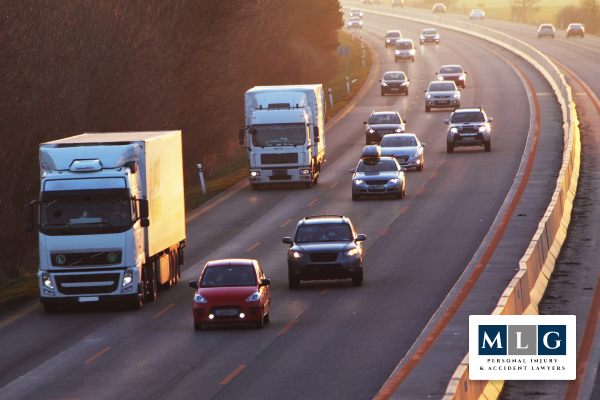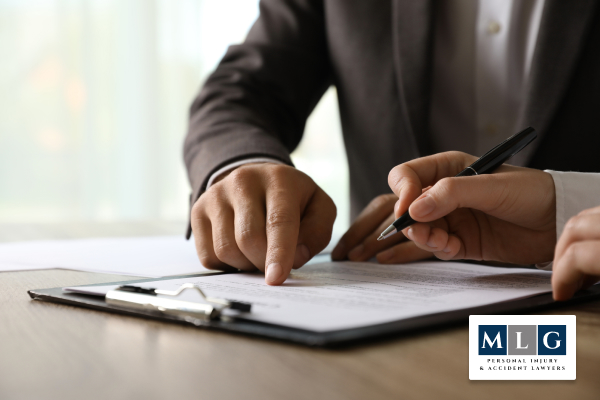
When a truck accident occurs, the consequences can be catastrophic because of the size and weight of the vehicles involved. Victims may face severe injuries, extensive medical treatment, and significant financial burdens.
Understanding the process of filing truck accident claims is critical for recovering the compensation you need to heal. An experienced truck accident lawyer will walk you through this complex process, helping you understand your rights and how to pursue justice.
At Marcereau Law Group, we fight for truck accident victims. We have unparalleled experience dealing with truck and car accident claims. We can hold truck and cargo owners responsible for the damage they cause.
Learn more about truck accident claims below. Then, contact us to schedule a free consultation.
A truck crash claim is a legal filing in which victims of truck accidents seek compensation for their injuries and damages. This form of claim can cover medical expenses, lost wages, property damage, and other losses.
Truck crashes often involve multiple parties, which can complicate the claim process. To succeed in a claim, victims need to prove that another party's negligence caused their injuries.
Handling the claim in the aftermath of a truck accident requires meticulous attention to detail. It is critical to collect all relevant evidence, including police reports, witness information, and medical documents.
This evidence will support your claim, demonstrating the extent of your injuries and the impact on your life. An experienced truck accident attorney will help make sure all necessary paperwork is collected and properly presented.

Truck accidents differ significantly from car accidents in various ways, making them more complex and challenging to handle. From the severity of injuries to the intricacies of legal proceedings, these collisions require a different approach when seeking compensation.
Below are some key differences between truck accidents and car accidents that highlight why handling truck accident cases requires specialized legal and insurance knowledge:
Truck crashes can result in catastrophic injuries because of trucks' massive size and weight compared to passenger vehicles.
The legal challenges involved in truck collisions are often more complex, involving multiple liable parties and commercial trucking laws.
The extent of property damage in truck accidents is usually greater, increasing the stakes of the insurance claims.
Truck drivers and trucking companies carry larger insurance policies, which means more money is at stake.
The trucking industry is subject to federal and state regulations, which can affect liability and compensation.
Investigations in truck accidents are more detailed, often requiring expert witnesses to interpret the evidence.
Negotiating settlements in truck accident cases can be more challenging due to the severity of injuries and the amount of money involved.
Several factors influence the value of your truck accident claim, as compensation is typically determined based on the overall impact the accident has had on your life. Understanding these factors can help you assess the potential worth of your claim and ensure you receive the compensation you deserve.
Here are the key elements that dictate the value of your claim:

Driver fatigue, distracted driving, and mechanical failures are among the common causes of truck accidents. Each of these factors can lead to catastrophic outcomes on the road, making it vital for truck drivers and trucking companies to follow all safety standards.
Many truck accidents are caused by driver fatigue as a result of violating hours of service regulations. These regulations are designed to ensure drivers have sufficient rest to operate their vehicles safely. When truck drivers or trucking companies ignore these rules, they put everyone on the road at risk.
Distracted driving is a common cause of all crashes, including truck accidents. When truck drivers are distracted by their phones, navigation systems, or other devices, their reaction times are significantly impaired, which can lead to accidents.
Driving under the influence of alcohol or drugs is incredibly dangerous, especially for truck drivers. The size and weight of vehicles involved make them more difficult to control, and being under the influence dramatically increases the risk of causing an accident.
Trucks require regular maintenance to operate safely. Mechanical failures can lead to serious accidents, particularly if critical systems like brakes or steering fail. Additionally, improperly loaded or overloaded trucks can cause balance issues, making them prone to rollovers.
Assigning liability in a truck accident can be complex due to the multiple parties involved. It is crucial to identify all potentially responsible parties to make sure that you receive fair compensation.
The truck driver can be deemed responsible if their negligence, such as speeding, distracted driving, or not following traffic laws, caused the accident. However, proving negligence requires solid evidence that the driver breached their duty to operate the vehicle safely.
Trucking companies are typically held liable for accidents involving their drivers, especially if they fail to enforce regulations, hire unqualified drivers, or maintain their fleets properly. This liability, under the theory of "respondeat superior," holds employers responsible for the actions of their employees while on the job.
If improper loading contributed to the accident, cargo loaders might be liable. Maintenance crews are responsible if their failure to maintain the truck caused the accident. Additionally, if a truck's part malfunctioned due to being poorly designed or manufactured, the manufacturer could be held liable.

Filing a truck accident claim can be a complex and overwhelming process, but taking the right steps early on can help protect your rights and increase your chances of receiving fair compensation.
It's essential to handle each stage carefully to ensure your claim is well-documented and supported by evidence.
Here are the key steps to follow when filing a truck accident claim:

If you or a family member has suffered a truck crash, it's vital to call an experienced truck accident lawyer. At Marcereau Law Group, we can handle your truck accident case.
We know the physical, emotional, and financial consequences a truck accident can create for all parties involved. We are here to help you through every truck accident claim process step. Let us pursue damages for your truck accident injuries.
Contact us today to schedule a free consultation. Let us negotiate a fair truck accident settlement for you and your family.
Schedule Your Free Consultation
"*" indicates required fields


"*" indicates required fields